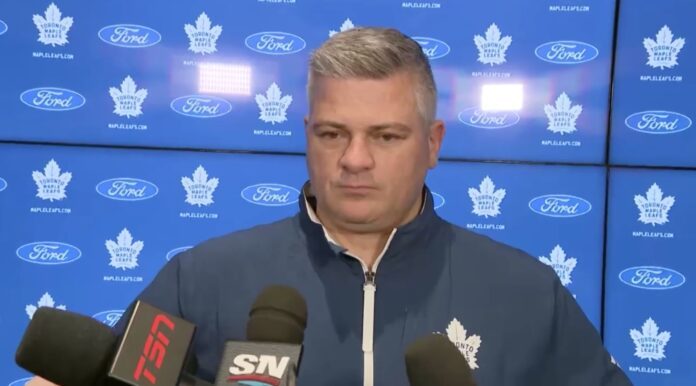
After a canceled practice on Tuesday, head coach Sheldon Keefe discussed prioritizing rest at this stage in the schedule, the status of Morgan Rielly and Mitch Marner, the shared responsibilities on the blue line, and the group of developing players on his roster.
How does canceling practice affect the players working their way back from injury?
Keefe: I don’t think it affects them other than they don’t get the benefit of having those extra reps and being as close to a game as you can get in terms of what you can replicate in practice. They don’t get the benefit of that, but it doesn’t impact our decision-making in terms of their availability. It is just on them to manage it and maximize what they can get out there.
What went into the decision to cancel practice?
Keefe: We felt good about the group’s response when we went toward rest, particularly last week when we didn’t make anything about the New Jersey game and how it went. We opted for rest and a meeting. The team responded very well in that moment.
We think it is important to bank these days now to ensure we are rested and fresh. Starting Saturday, we are going to go into five games in eight nights. You can’t control that schedule. Right now, we have a little bit more control over how we handle things.
The rest piece seems to help our group. We have felt like a more rested team in the games we have played of late in terms of the jump and energy that we’ve had. We are trying to capitalize on it as best we can at this time of year.
What is the status of Mitch Marner and Morgan Rielly?
Keefe: Morgan will be available for us (on Wednesday). I haven’t had a chance to discuss with Mitch, but we are going to feel it out and talk to him. We will likely make it more of a target for the weekend.
With Rielly returning, can you start to settle into the playoff defense pairings, or is there still too much up in the air?
Keefe: We can get closer to it perhaps, but if we have learned anything, it’s that we have nine defensemen who can all play and do a good job for us.
We have time left. We don’t know what the time will tell us in terms of those right D pairs. We don’t know who is going to be healthy and who isn’t. We don’t know who our opponent is going to be. All of these sorts of things will play themselves out.
We like that we have options. We have nine players on defense now who have all done a good job, played against good teams, and helped us win games. They have been flexible in who they have played with and what the roles have been. It gives us lots of options.
The time we have left will help us make the appropriate decisions.
Why do you think a by-committee approach to the responsibilities on the backend could be a good approach over a long playoff run?
Keefe: I think each team has a different way of going about things. There is not just one way to do it.
A by-committee approach allows you to spread out the minutes and responsibilities. It also keeps everybody in a regular rhythm. There are some positives to it.
There is the confidence that the coaching staff shows in the players to go out and play against anybody. When healthy, I think we are going to be in that situation where we can trust guys to play in different spots.
Because of the injuries we’ve had, almost every single guy on our team on defense, at different times, has had to play against top competition to help us get through tough situations. That gives the coaching staff confidence, which you can then pass along to the players.
With the skill set and experience we have within our D core, we can deploy them that way. I don’t think there is a clear pairing that you would say needs to absolutely play in this situation. I think the group is optimized where they are sharing the responsibility, and the forwards have to be connected to it as well to do the job.
Among the group of younger players on the roster — Holmberg, Robertson, Knies — how do you think they are preparing for the fact that playoffs are just around the corner and they have to be ready for them?
Keefe: All of those guys that you mentioned are developing well. They made a great impact on the game last night for us. They have been playing well, and playing together creates an additional challenge for them. They don’t have the experience to lean on with others. They are trying to feel it out for themselves.
Playoffs in the NHL are a far different animal, but in this case, they have all played playoff games. Matthew Knies played for us just last season, but there have been pressure situations they’ve played in, be it college or world juniors. Pontus Holmberg was a playoff MVP in Sweden before he came over here. These guys have all played at that time of the year before. They have a sense of what it is like.
To me, it is about their continued development in the NHL and less about playoffs necessarily. To that end, we have been really happy with them. They have all done a good job.
Last night, we made a decision in the third period. It was partially about going with other guys who could get it done for us. Also, when you give up two goals in the second period, confidence starts to wane. For young players, you have to protect them in that moment as well.
I was exposing them to some tough matchups on purpose. They were doing well in that regard early in the game, but it didn’t go as well in the third period. It wasn’t all on them. There are other elements to it. But you want to give those guys opportunities to grow. In some cases, protecting them is part of it.
Does that explain Matthew Knies’ ice time at just 6:57?
Keefe: That is part of it, but he is also not on penalty kill or power play. Last night, there was a fair bit of special teams time. That is why he is below 10 minutes — the lack of special teams — but once the game got a little bit tighter in the third period, I opted to go with three lines. Their minutes were less as a result of that.
The team is looking to win now, but it has also been bringing along a lot of young players this season. How impressed are you with the overall development of the youth?
Keefe: We feel good about it. The guys have done a good job. It is a reflection of the talent that the guys have and the decisions that were made to bring guys in.
We have Knies, Holmberg, and Robertson as three draft picks. But we talk about McMann, his development, and his identification coming in as a free agent and working his way through the ECHL, AHL, and now the NHL. You look at other examples like Benoit or Timmins, who was acquired in a trade. He is playing a really important role for us right now at a critical time of year when we are trying to clinch a playoff spot. There is Dewar, who has come in with the timing of his trade and the injuries we’ve had and made an impact on special teams with the penalty kill and defensive responsibilities.
All of these guys have come in and done a good job, which is a credit to the management team, the scouting team, the development team, and our coaching staff. The assistant coaches have done a really good job of preparing these guys and working with them every day. The players themselves, of course, have done a nice job.
































